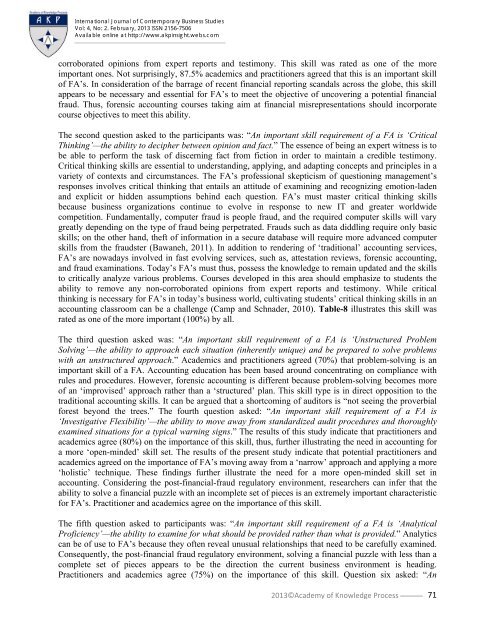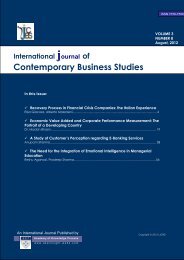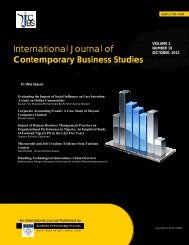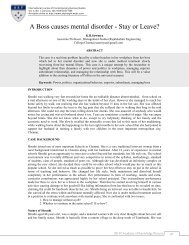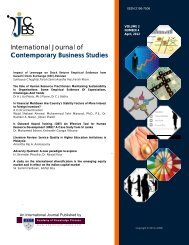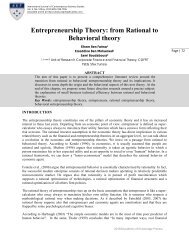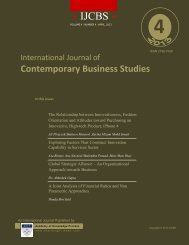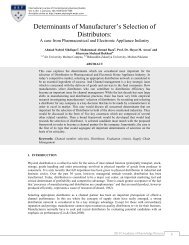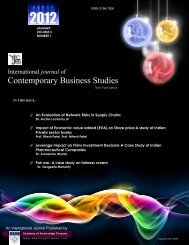Contemporary Business Studies - Academy of Knowledge Process ...
Contemporary Business Studies - Academy of Knowledge Process ...
Contemporary Business Studies - Academy of Knowledge Process ...
You also want an ePaper? Increase the reach of your titles
YUMPU automatically turns print PDFs into web optimized ePapers that Google loves.
International Journal <strong>of</strong> <strong>Contemporary</strong> <strong>Business</strong> <strong>Studies</strong>Vol: 4, No: 2. February, 2013 ISSN 2156-7506Available online at http://www.akpinsight.webs.comcorroborated opinions from expert reports and testimony. This skill was rated as one <strong>of</strong> the moreimportant ones. Not surprisingly, 87.5% academics and practitioners agreed that this is an important skill<strong>of</strong> FA’s. In consideration <strong>of</strong> the barrage <strong>of</strong> recent financial reporting scandals across the globe, this skillappears to be necessary and essential for FA’s to meet the objective <strong>of</strong> uncovering a potential financialfraud. Thus, forensic accounting courses taking aim at financial misrepresentations should incorporatecourse objectives to meet this ability.The second question asked to the participants was: “An important skill requirement <strong>of</strong> a FA is ‘CriticalThinking’—the ability to decipher between opinion and fact.” The essence <strong>of</strong> being an expert witness is tobe able to perform the task <strong>of</strong> discerning fact from fiction in order to maintain a credible testimony.Critical thinking skills are essential to understanding, applying, and adapting concepts and principles in avariety <strong>of</strong> contexts and circumstances. The FA’s pr<strong>of</strong>essional skepticism <strong>of</strong> questioning management’sresponses involves critical thinking that entails an attitude <strong>of</strong> examining and recognizing emotion-ladenand explicit or hidden assumptions behind each question. FA’s must master critical thinking skillsbecause business organizations continue to evolve in response to new IT and greater worldwidecompetition. Fundamentally, computer fraud is people fraud, and the required computer skills will varygreatly depending on the type <strong>of</strong> fraud being perpetrated. Frauds such as data diddling require only basicskills; on the other hand, theft <strong>of</strong> information in a secure database will require more advanced computerskills from the fraudster (Bawaneh, 2011). In addition to rendering <strong>of</strong> ‘traditional’ accounting services,FA’s are nowadays involved in fast evolving services, such as, attestation reviews, forensic accounting,and fraud examinations. Today’s FA’s must thus, possess the knowledge to remain updated and the skillsto critically analyze various problems. Courses developed in this area should emphasize to students theability to remove any non-corroborated opinions from expert reports and testimony. While criticalthinking is necessary for FA’s in today’s business world, cultivating students’ critical thinking skills in anaccounting classroom can be a challenge (Camp and Schnader, 2010). Table-8 illustrates this skill wasrated as one <strong>of</strong> the more important (100%) by all.The third question asked was: “An important skill requirement <strong>of</strong> a FA is ‘Unstructured ProblemSolving’—the ability to approach each situation (inherently unique) and be prepared to solve problemswith an unstructured approach.” Academics and practitioners agreed (70%) that problem-solving is animportant skill <strong>of</strong> a FA. Accounting education has been based around concentrating on compliance withrules and procedures. However, forensic accounting is different because problem-solving becomes more<strong>of</strong> an ‘improvised’ approach rather than a ‘structured’ plan. This skill type is in direct opposition to thetraditional accounting skills. It can be argued that a shortcoming <strong>of</strong> auditors is “not seeing the proverbialforest beyond the trees.” The fourth question asked: “An important skill requirement <strong>of</strong> a FA is‘Investigative Flexibility’—the ability to move away from standardized audit procedures and thoroughlyexamined situations for a typical warning signs.” The results <strong>of</strong> this study indicate that practitioners andacademics agree (80%) on the importance <strong>of</strong> this skill, thus, further illustrating the need in accounting fora more ‘open-minded’ skill set. The results <strong>of</strong> the present study indicate that potential practitioners andacademics agreed on the importance <strong>of</strong> FA’s moving away from a ‘narrow’ approach and applying a more‘holistic’ technique. These findings further illustrate the need for a more open-minded skill set inaccounting. Considering the post-financial-fraud regulatory environment, researchers can infer that theability to solve a financial puzzle with an incomplete set <strong>of</strong> pieces is an extremely important characteristicfor FA’s. Practitioner and academics agree on the importance <strong>of</strong> this skill.The fifth question asked to participants was: “An important skill requirement <strong>of</strong> a FA is ‘AnalyticalPr<strong>of</strong>iciency’—the ability to examine for what should be provided rather than what is provided.” Analyticscan be <strong>of</strong> use to FA’s because they <strong>of</strong>ten reveal unusual relationships that need to be carefully examined.Consequently, the post-financial fraud regulatory environment, solving a financial puzzle with less than acomplete set <strong>of</strong> pieces appears to be the direction the current business environment is heading.Practitioners and academics agree (75%) on the importance <strong>of</strong> this skill. Question six asked: “An2013©<strong>Academy</strong> <strong>of</strong> <strong>Knowledge</strong> <strong>Process</strong>71


